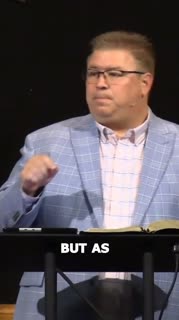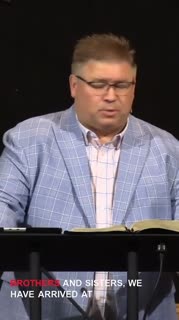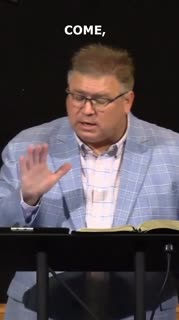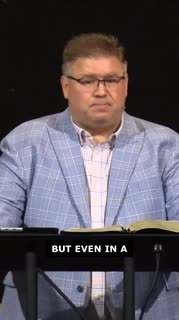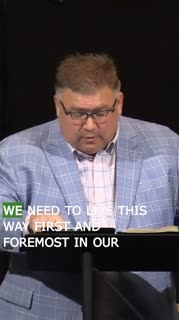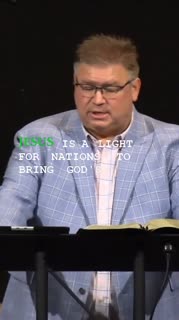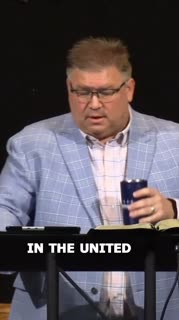Awakening Christian Responsibility in a Moral Crisis
Devotional
Sermon Summary
Bible Study Guide
Sermon Clips
1) "But as believers, we are always wanting to target our own hearts. The Lord is wanting to target our hearts. We are wanting to try to target the hearts of others. And so we have a dual purpose as we live in this nation. The United States of America is not God's chosen nation. We have a privilege of living in this wonderful nation. We experience freedoms that people across the globe do not experience. We experience freedoms that people across the globe do not experience. We experience to experience. But you know where the gospel of Jesus, you know where the church is really thriving? In nations where there's active persecution. In nations where it's not easy to be a Christian." [08:03] (44 seconds)
2) "Brothers and sisters, we have arrived at a cultural moment where we are calling evil good and good evil. Now, who are the we I'm referring to? I'll just give it to you in two very broad categories. The citizens who make up this great nation that we are privileged to call the people of Israel. And the people of Israel who make up this great nation that we are calling our earthly home. But I don't believe that we can just point the finger outward toward other people, many of whom who don't know the Lord Jesus. Why would we expect anything different from those who don't claim the name of Jesus? I don't mean that they're all horrible people, but I do mean we should expect people who don't know the Lord to live as those who don't know the Lord." [11:00] (46 seconds)
3) "Persecution will come, friends, because of darkness. People are going to seethe with anger toward us and hatred toward those who walk in the truth because they ultimately love darkness, and we are called to be light in a dark world, knowing with our hope fixed on the reality that some will come to the light, and some will come to the light, and some will come to the light, will find salvation through Christ alone. And that's what we live for, friends. That's what we set our aim on. That's what we set our hope on." [14:53] (37 seconds)
4) "But even in a society where evil is rampant, Christians have the opportunity, the privilege, and I believe the cultural mandate to live in such a way in how we live, in how we speak, in what we stand up for, to try to help reign in the evils of society. We have an opportunity to influence policy decisions. We have an opportunity to influence how people live around us. I I've been around people sometimes, and once they find out I'm a pastor, all of a sudden they stop cussing. And, oh, I'm sorry, I didn't know you were a pastor. I'm like, you know, it's not me that you're offending so much as the Lord. And I say it with a smile because it's true. I don't melt when I hear a cuss word." [19:34] (54 seconds)
5) "We need to live this way first and foremost in our own life. It is totally hypocritical and inconsistent for us to live one way. And then demand that other people live another way. So first and foremost, we need to look at our own lives, our own hearts, our own actions, before we begin striving. to impress it on others. But beyond living as salt in our own lives, we've got a responsibility to others in society to stand for what is biblically right, to stand for those who are not able to stand for themselves. And I believe this means it's our responsibility to vote in our elections while we're still able to." [20:15] (44 seconds)
6) "Jesus is a light for nations to bring God's salvation to the ends of the earth. And we have the immense privilege, brothers and sisters, of being part of that great work. But this great work is more than simply evangelizing and discipling. Sometimes people think the number one and sometimes even sole job of the church is to evangelize. And that is a large part of what God has called us to do. But it is not greater than making disciples. Making disciples and teaching them all that I have commanded you to do. That's the call. Evangelize, right? Evangelize, which is making disciples and teaching and training them all that I have commanded you is equal with discipling, friends. It's standing for Christ in the public square wherever we can." [34:33] (52 seconds)
7) "In the United States, our founders took an incredible risk. They gave sovereign power to we the people. So we, the people of the United States, hold the power of our national sovereignty. And I would say still under the Lord's will. And we exercise that responsibility every couple years on election day in particular. When we do our part to appoint the candidate who seems most likely to move our nation toward values that align with the Bible. That's not to say that there's a candidate who exemplifies those values even well. What an incredible opportunity it is before us, friends. We get to stand up with biblical, courageous conviction. We get to be active in the election by prioritizing what God prioritizes." [35:29] (59 seconds)
Ask a question about this sermon
2) "Brothers and sisters, we have arrived at a cultural moment where we are calling evil good and good evil. Now, who are the we I'm referring to? I'll just give it to you in two very broad categories. The citizens who make up this great nation that we are privileged to call the people of Israel. And the people of Israel who make up this great nation that we are calling our earthly home. But I don't believe that we can just point the finger outward toward other people, many of whom who don't know the Lord Jesus. Why would we expect anything different from those who don't claim the name of Jesus? I don't mean that they're all horrible people, but I do mean we should expect people who don't know the Lord to live as those who don't know the Lord." [11:00] (46 seconds)
3) "Persecution will come, friends, because of darkness. People are going to seethe with anger toward us and hatred toward those who walk in the truth because they ultimately love darkness, and we are called to be light in a dark world, knowing with our hope fixed on the reality that some will come to the light, and some will come to the light, and some will come to the light, will find salvation through Christ alone. And that's what we live for, friends. That's what we set our aim on. That's what we set our hope on." [14:53] (37 seconds)
4) "But even in a society where evil is rampant, Christians have the opportunity, the privilege, and I believe the cultural mandate to live in such a way in how we live, in how we speak, in what we stand up for, to try to help reign in the evils of society. We have an opportunity to influence policy decisions. We have an opportunity to influence how people live around us. I I've been around people sometimes, and once they find out I'm a pastor, all of a sudden they stop cussing. And, oh, I'm sorry, I didn't know you were a pastor. I'm like, you know, it's not me that you're offending so much as the Lord. And I say it with a smile because it's true. I don't melt when I hear a cuss word." [19:34] (54 seconds)
5) "We need to live this way first and foremost in our own life. It is totally hypocritical and inconsistent for us to live one way. And then demand that other people live another way. So first and foremost, we need to look at our own lives, our own hearts, our own actions, before we begin striving. to impress it on others. But beyond living as salt in our own lives, we've got a responsibility to others in society to stand for what is biblically right, to stand for those who are not able to stand for themselves. And I believe this means it's our responsibility to vote in our elections while we're still able to." [20:15] (44 seconds)
6) "Jesus is a light for nations to bring God's salvation to the ends of the earth. And we have the immense privilege, brothers and sisters, of being part of that great work. But this great work is more than simply evangelizing and discipling. Sometimes people think the number one and sometimes even sole job of the church is to evangelize. And that is a large part of what God has called us to do. But it is not greater than making disciples. Making disciples and teaching them all that I have commanded you to do. That's the call. Evangelize, right? Evangelize, which is making disciples and teaching and training them all that I have commanded you is equal with discipling, friends. It's standing for Christ in the public square wherever we can." [34:33] (52 seconds)
7) "In the United States, our founders took an incredible risk. They gave sovereign power to we the people. So we, the people of the United States, hold the power of our national sovereignty. And I would say still under the Lord's will. And we exercise that responsibility every couple years on election day in particular. When we do our part to appoint the candidate who seems most likely to move our nation toward values that align with the Bible. That's not to say that there's a candidate who exemplifies those values even well. What an incredible opportunity it is before us, friends. We get to stand up with biblical, courageous conviction. We get to be active in the election by prioritizing what God prioritizes." [35:29] (59 seconds)
